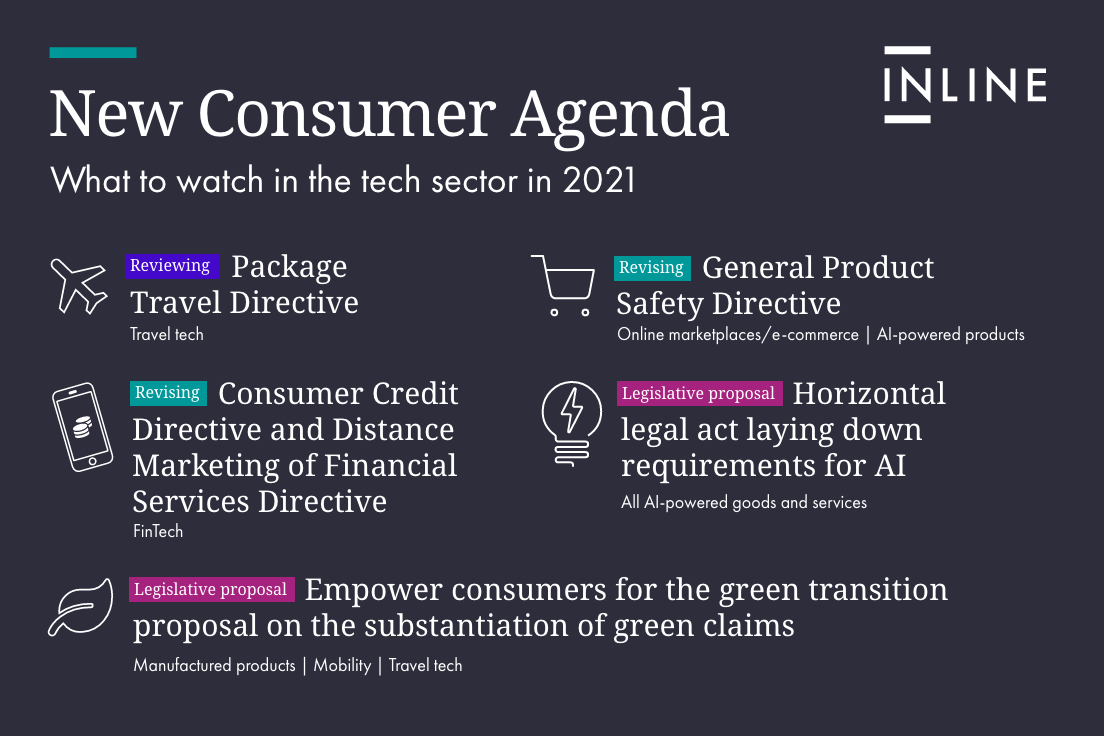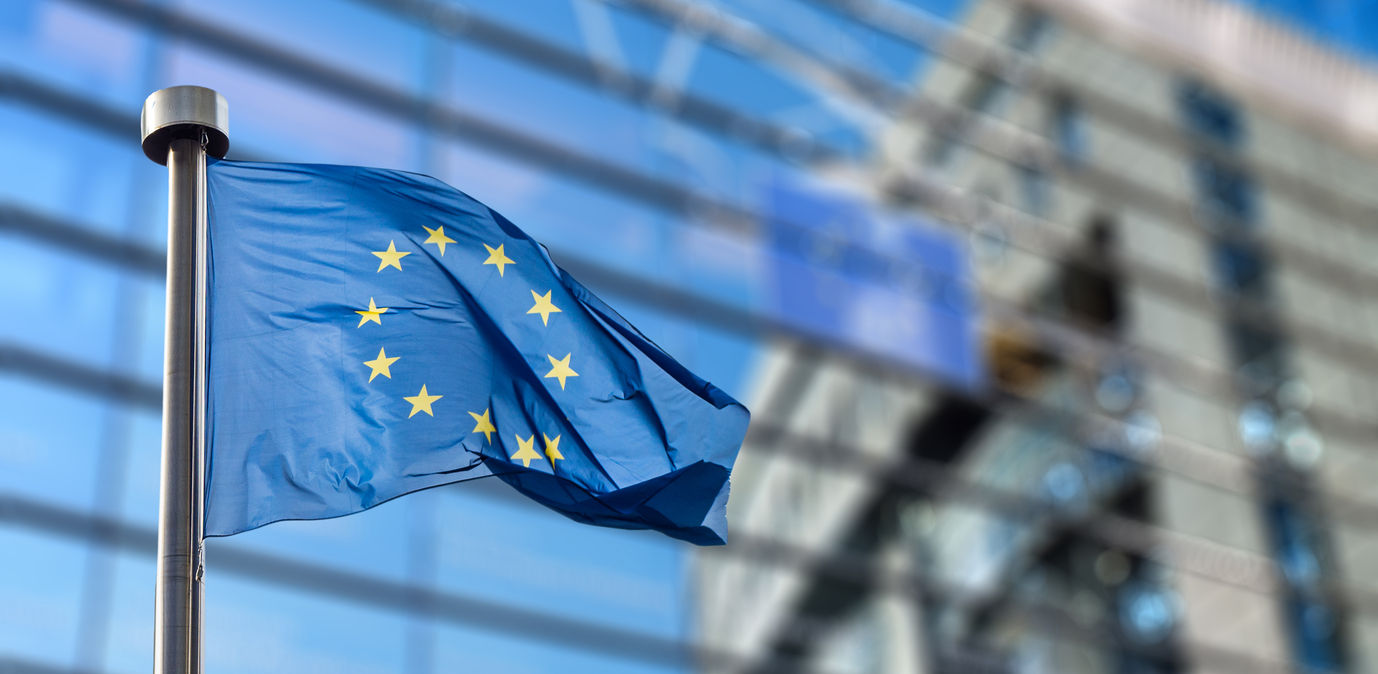What does the New Consumer Agenda mean for the tech sector?
by Inline Policy on 03 Dec 2020
The European Commission’s recently adopted New Consumer Agenda frames its objectives for EU consumer policy up to 2025. In this blog we outline what it means for the tech and digital sectors, and what consumer policy initiatives we can expect.
The Agenda outlines actions and initiatives on consumer policy in five areas:
- The green transition
- The digital transformation
- Redress and enforcement of consumer rights
- Specific needs of certain consumer groups
- International cooperation.
Some of these initiatives will be familiar to the tech sector as they have already been announced in other EU strategies including the EU’s Digital Strategy, the European Green Deal, and the Circular Economy Action Plan. Following a public consultation this year, the Agenda also includes new measures on consumer protection to address the impact of COVID-19.
What does the New Consumer Agenda mean for the tech and digital sectors, and what consumer policy initiatives can we expect? In this post, we outline four initiatives under the Agenda taking place over the next year that will impact the tech and digital sectors over the next five years.
1. Empowering consumers for the green transition
The Commission aims to present a legislative proposal in 2021 to ‘empower consumers for the green transition’. The European Green Deal – launched in December 2019 – outlined plans to help provide consumers with better information on the sustainability of products, as well as addressing issues such as ‘greenwashing’ (false environmental claims) and early obsolescence. Providing consumers with more information on the durability, reparability or upgradability of products should help them make more informed choices. Although the legislative proposal in expected to be broad and will complement more targeted rules contained in sectoral legislation, for example on specific products, this initiative highlights growing attention on the lifespan of products (including electronics) and their environmental footprint. Businesses could face further scrutiny over their environmental actions through the information they provide to consumers on the green credentials of a product, and the veracity and accuracy of this information.
2. Horizontal requirements for Artificial Intelligence
Artificial Intelligence remains a focus of EU digital policy and will be addressed in the upcoming Digital Services Act and Digital Markets Act. Plans to introduce a proposal for a horizontal legal act laying down requirements for Artificial Intelligence in 2021 were included in the Commission’s White Paper on Artificial Intelligence, published in February 2020. The New Consumer Agenda, however, highlights the wide range of impacts AI has on consumers through, for example, distorting consumer choices (e.g. through data collection; targeted advertising), material harm (e.g. AI-powered robotic applications; autonomous vehicles); and discrimination. Based on the Commission’s Inception Impact Assessment on the requirements for AI, a range of options are available. Measures could include building on the EU’s Ethics guidelines for trustworthy AI and introducing a voluntary labelling scheme to allow customers to identify AI applications which follow requirements for trustworthy AI; or establishing requirements on issues such as training data, and record-keeping for datasets and algorithms, based on the perceived ‘risk’ of a certain AI application.
3. Revision of the General Product Safety Directive
The Commission will propose a revision of the General Product Safety Directive in 2021. The Directive provides the legal framework for the safety of non-food consumer products in the EU but, as it nearly 20 years old, will need to be updated to reflect changes to products and the rise of new technologies including AI. The review will also address product safety challenges from online sales, including online marketplaces with third-party sellers, as current rules on product safety are unclear. The Commission is also expected to look at third-country (non-EU) sellers due to the challenges of checking the safety of products purchased by EU consumers; as well as engaging with the seller if they are not represented in the EU market. The review of the General Product Safety Directive could introduce a number of measures affecting online marketplaces. These could include making some of the (currently voluntary) Product Safety Pledge binding and – importantly for tech firms – classify standalone software as a ‘product’. Reviewing the General Product Safety Directive will ensure the Directive is up-to-date and reflects changing technologies, products, and markets. It could also have a significant impact on online marketplaces’ obligations to ensure product safety.
4. Reviewing the Package Travel Directive
The EU’s Package Travel Directive has come under intense scrutiny – and criticism – during the COVID-19 crisis. Under the Directive, travellers are entitled to a full refund within 14 days if their package travel is cancelled (subject to conditions). Although travellers can be offered vouchers as reimbursement, they still have the right to a full cash refund. The travel sector has come under pressure during the COVID-19 crisis to comply with these rules, with many companies providing vouchers, delaying reimbursement, and infringing consumer rights. Following the bankruptcy of British tour operator Thomas Cook in 2019, there has also been increased pressure to ensure that consumers are protected under the Directive from airline insolvency. The Commission will review the adequacy of the Package Travel Directive by 2022, with a report on its application due in 2021. Any changes to the Package Travel Directive – and refund processes – could have a significant impact on the travel sector and Online Travel Agencies (OTAs).

What next?
Under the New Consumer Agenda, the EU will continue to review, adapt and launch consumer policies in response to new technologies, new products, and new threats to consumer protection. A number of these policies will likely have a direct impact on companies in the tech and digital sector, ranging from producers of electronics and software, to online marketplaces and travel booking platforms. With a lot of work on the four initiatives outlined expected to take place next year, 2021 will be a year to watch for consumer protection.
Topics: EU, Regulation, Technology






Comments